Ready for an adventure that mixes work and wanderlust? Check out my handpicked list of the coolest, under-the-radar spots for remote workers.
Whether you’re already a digital nomad or just itching to make your living room view a little more scenic, I’ve got you covered. I’ve visited most of the places on this list, working as I traveled the globe in many of them.
Ever thought about typing away in a cozy café in Merida, Mexico, or brainstorming your next big project on the beaches of Huatulco? How about trading your usual office for the historic streets of Seville, Spain, or finding inspiration among the colonial buildings of Penang, Malaysia?

Exploring Less Traveled Digital Nomad Destinations
Yeah, I thought that might grab your attention. These off-the-beaten-path places aren’t just beautiful backdrops for your Zoom calls; they’re where high-speed internet and low living costs meet incredible culture and a buzzing community.
From the charm of Porto, Portugal, to the tranquil vibes of Siem Reap, Cambodia, every spot on my list has something unique to offer. So, why stick to the usual when you can work (and play) in some of the world’s most inspiring locales?
Let’s find your next great adventure.
My top unusual spots for digital nomads:
- Merida, Mexico
- Porto, Portugal
- Seville, Spain
- Huatulco, Mexico
- Siem Reap, Cambodia
- Penang, Malaysia
- Malaga, Spain
Read on to learn more about why these destinations made the cut, and discover eight more bonus places. Where will you log in from next?
What makes a destination good for digital nomads?
The ideal place for a digital nomad starts with reliable high-speed internet, affordable living costs, and coworking spaces. A strong community of like-minded individuals is vital for networking and socializing as well. Generally, that means a community of other expats.
Safety, good weather, and access to healthcare are also crucial, as is a great VPN with a browser extension, like those listed by Techopedia, as this will help you access webpages from anywhere in the world so you can continue working as normal, and even access streaming and gaming services in your downtime.
Top that off with a vibrant local culture, leisure activities, and easy visa processes (or ideally, no visa requirements) and you’ll get a place that’s attractive for long-term workers.

My Favorite Lesser Known Spots for Digital Nomads
Here are a few of my favorite lesser-known spots for remote workers. If you’re just starting out in remote work, they’ll be hidden gems, but if you’ve traveled a bit, you may recognize a few of the names.
Merida, Mexico
I’ve spent a week or two in Merida over the years, and it’s absolutely somewhere I’ll go back to as a digital nomad.
The city’s reliable internet, affordable living costs, and plenty of cozy cafes and coworking spaces (like Conexión60 and Enter_Work) make it an easy place to get work done. There’s even an international airport (MID), and good bus service with ADO buses.
It’s also a fun place to live, with lively markets, bustling plazas, and an ever-growing digital nomad community. Merida is the capital of the Yucatan Peninsula, with plenty of Mayan heritage and colonial history.
Cons of Merida as a digital nomad
If you’re a beach bum, one of the downsides of living here is that Merida isn’t right on the ocean. The closest beach is at the busy, and often windy, seaside town of Progreso, which is about a 45 minute drive. If you go to Progreso, be sure to check out the flamingos and pink salt flats nearby.



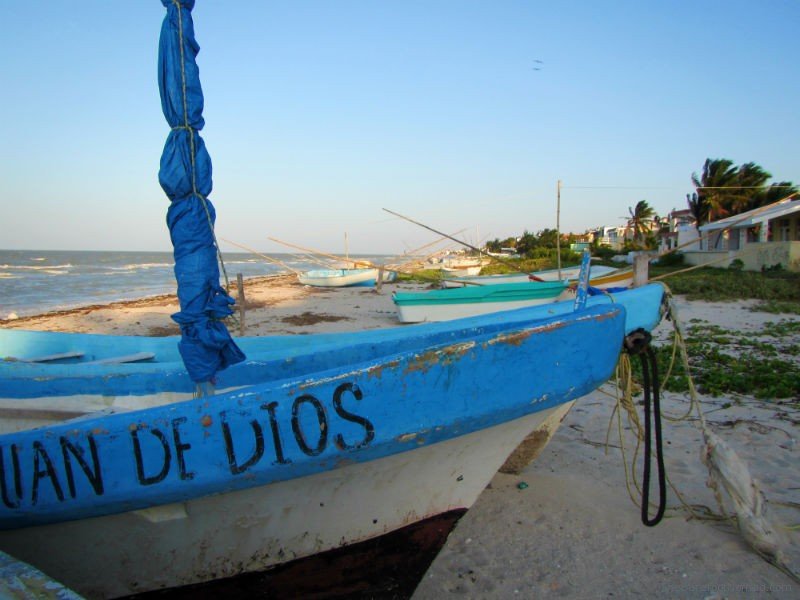
Seville, Spain
Ah, Seville! My last stay there was in April, so I missed the iconic sight of trees covered in orange blossoms (blossoms usually end in March). Even so, there was plenty to see in sunny Seville, between taking in enchanting flamenco dancers, the impressive architecture of the Plaza de Espana, and the little things about Seville that you won’t find in your guidebook.
Seville’s growing digital nomad scene includes coworking spaces and a fast internet infrastructure, making it an ideal spot for productivity. After hours, the lively tapas bars and flamenco dance halls invite you to immerse yourself in Andalusian tradition. Make sure to check this Andalusian capital’s many historic landmarks, including the Alcázar palace, the Giralda tower, and the Plaza de España.
Cons of Seville as a digital nomad
Seville isn’t the place for you if you don’t like hot weather. It’s a dry climate here, and can easily hit 40º C (104º F) in the summer (though it is temperate in the winter). Seville can also be pricey, especially for attractions and housing.
Malaga, Spain
I spent over a month with my family in the small town of Nerja, Spain, and while I loved our stay there, Nerja is just a bit too small to make the cut for this list, as it lacks some coworking spaces and easy access to an international airport.
Instead, my pick for the digital nomad is nearby Malaga. Malaga’s a proper city of over half a million people. It’s nestled along Spain’s Costa del Sol, with the allure of Mediterranean beaches, a rich cultural heritage (it’s Picasso’s birthplace!), and wonderful weather.
With high-speed internet, a supportive international community, and plenty of coworking spaces, it’s easy to get work done here. Check out El Centro Coworking and Grow Working, but there are plenty of other great coworking spots and cafes in Malaga.
Cons of Malaga for remote workers
Like any larger city, Malaga can be busy, so it may not be a fit if you’re looking for a quiet vibe. There’s also a bit of litter outside of the main tourist areas, and accommodation can be pricey.
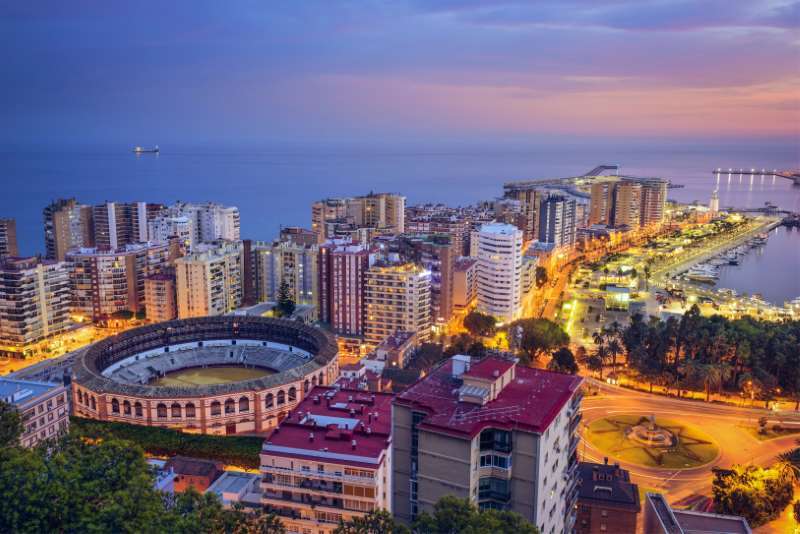
Huatulco, Mexico
Huatulco (pronounced wah-TOOL-coh) is a bit of an outlier on this list. While the town of Huatulco is off the beach itself, nearby La Crucecita, Puerto Escondido or Mazunte is where it’s at. Though there is an international airport halfway between the beach towns and the city proper, it doesn’t offer tons of international flights.
Charles’ nephew made Huatulco his winter digital nomad hub the past few years, inspiring us to check it out ourselves. Charles spent ten days in Huatulco this year, and we’re planning to go back as a family.
What it lacks in coworking spaces, the Huatulco area (Bahías de Huatulco) definitely makes up for it with great beaches and charm. There is decent high-speed internet here (plus Starlink use is popular in the area), and modern amenities.
Huatulco is on Mexico’s Pacific coast, offering a tranquil escape with pristine beaches and untouched natural landscapes. Unlike more frequented tourist destinations, Huatulco prides itself on its sustainable development and relaxed atmosphere.
La Crucecita’s charming center, with its local markets and friendly community, gives a glimpse into authentic Mexican culture. Mazunte gives off chill, hippie vibes with plenty of yoga studios and smoothie stations to give anything in South East Asia a run for it’s money. Puerto Escondido is where the party happens and there’s plenty of things to do when the sun sets and it’s time to put the laptop away.
Cons of Huatulco for digital nomads
Housing in Huatulco is definitely on the pricey side, so be prepared to shell out. It can also be brutally hot, even in the winter, as it’s in Oaxaca state, close to Guatemala and it seems the sun shines all winter long.
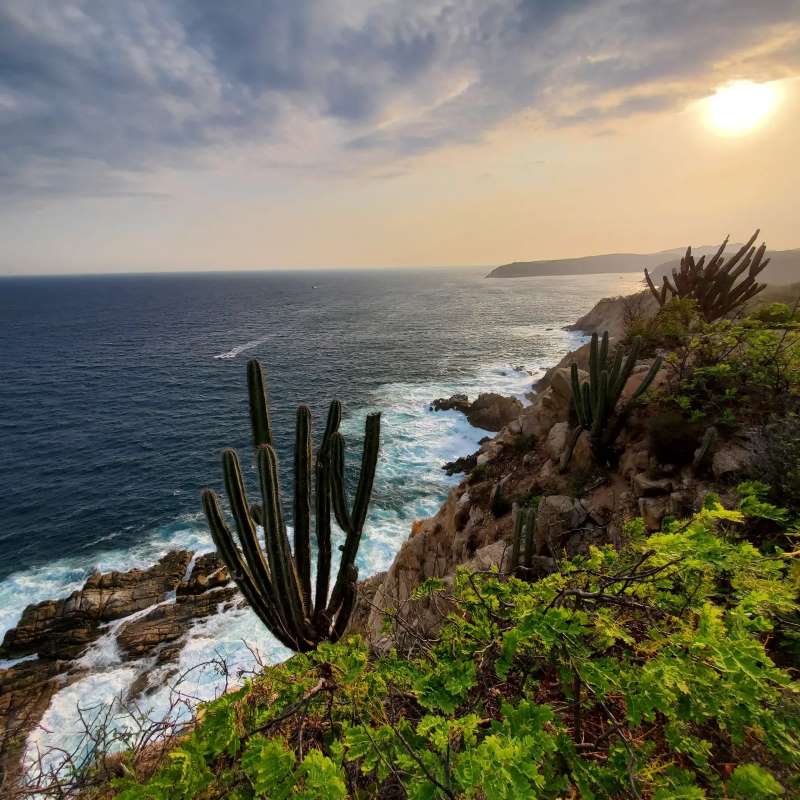
Porto, Portugal
I adore gritty Porto. It’s a bit rougher around the edges than beautiful Lisbon, but that’s part of its charm. There’s a vibrant, creative energy here, and a growing digital nomad scene.
There are plenty of great coworking spaces in Porto (to start, try Land Porto Coworking or WOW – Coworking Porto). The internet’s fast, and there are great cafes everywhere.
One of the advantages of being a remote worker in Porto is that it’s more affordable than most other European cities, including Lisbon. You’ll find affordable housing, wonderful bakeries, and you won’t need to spend a fortune on eating out or attractions.
Be sure to visit the Livraria Lello – often called the most beautiful bookstore in the world. Even with the lineups and cost to enter, I think it’s worth it.
Cons of Porto for digital nomads
Porto’s a smaller city than Lisbon, so there aren’t as many networking opportunities here. The center of Porto is busy and gorgeous, but the outskirts are industrial and many sections feel abandoned. The weather can also be unpredictable.
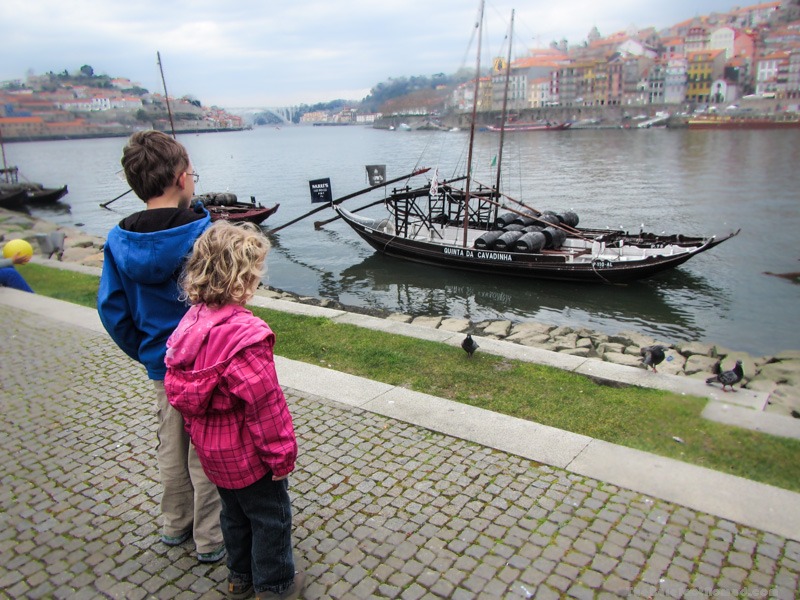
Penang Island, Malaysia
Penang’s capital, George Town, was my base when Charles and I visited Malaysia. I have great memories of exploring colonial buildings, and enjoying affordable freshly squeezed fruit and delicious meals from street vendors.
You can even get local strawberries and apples in Penang, which is unusual for a tropical area. They’re grown in the nearby Cameron Highlands.
The city is a tech hub with reliable internet, plenty of coworking spaces (start with Settlements Penang or Common Ground), and a supportive expat community.
George Town, Penang’s capital, is a UNESCO World Heritage site with an interesting blend of colonial buildings, modern street art, and vibrant food scene.
Cons of Penang for digital nomads
Penang is a small island, and it can feel a bit claustrophobic after a week or two. On top of that, the weather’s generally hot and humid, meaning you’ll need to do most of your work indoors in air conditioning.

Siem Reap, Cambodia
I spent a bit of time in Siem Reap as we visited the ancient temples of Angkor Wat. One of the things I noticed right away was that the internet was fast, and the air conditioning was robust.
For remote workers, Siem Reap has an affordable cost of living, a warm climate, and a laid-back lifestyle. There’s also a surprisingly robust internet infrastructure.
The town has developed a cozy café culture and coworking environment (start at the oddly named 1961 Coworking and Art Space), catering to the global community of digital nomads drawn to its charm. Beyond work, Siem Reap’s vibrant night markets, local artisan shops, and serene rice fields are wonderful for exploration and relaxation.
Cons of Siem Reap for digital nomads
There are real downsides to Siem Reap. Public transport is definitely lacking, and there’s an issue with petty crime and burglary. On top of that, it’s a small place, and may not have the opportunities for networking of larger cities. It’s also busy and touristy, and you’ll spend a lot of time dealing with people trying to sell you things, some legal, and some not so legal.

Runner-ups for Lesser Known Digital Nomad Locations
I haven’t visited all of the following areas, but I’ve included them in this article, as they’re mentioned consistently among our traveling friends, and the digital nomad community.
Cuenca, Ecuador
Nestled in the highlands of Ecuador, Cuenca is a colonial city known for its stunning architecture, cultural festivals, and friendly locals.
Remote workers are drawn to Cuenca for its affordable cost of living, temperate climate, and reliable internet, making it an ideal place for creativity and concentration.
The city’s historic center, a UNESCO World Heritage site, offers peaceful plazas, museums, and cafes where you can work while soaking in the local culture. There’s plenty to do on weekends spent exploring nature, from hiking in the Cajas National Park to relaxing in nearby hot springs.
Chiang Dao, Thailand
Most digital nomads don’t think beyond Thailand’s cities of Bangkok or Chiang Mai, or the crowded island of Phuket. While I visited all three of these, and plenty others, in my three months in Thailand, I didn’t quite manage to make it to smaller Chiang Dao, which is getting a reputation as a solid digital nomad hub.
Quiet Chiang Dao is a town embraced by mountains and forests, with only around 15,000 people. The internet connectivity is unexpectedly good, and it’s easy to access from Chiang Mai. There are waterfalls, hot springs, artist’s workshops, and good food. Just make sure you get the right visa before setting up as a digital nomad in Thailand, no matter which region you choose.

Sibiu, Romania
In the midst of Transylvania, Sibiu offers a medieval old town, but there’s plenty of modern infrastructure beyond the cobblestone streets and the majestic Brukenthal Palace.
Sibiu is known as a tranquil yet inspiring setting for digital nomads, with its excellent internet and charming cafes.
Lesser Known Digital Nomad Locations in the USA and Canada
When I think of digital nomad locations, I always default to Asia, Europe, or even Mexico, but there are plenty of great places to do remote work in Canada and the US.
Astoria, Oregon
I may show my age here, but I first saw Astoria in Arnold Schwarzenegger’s comedy, Kindergarten Cop.
I’ve since visited Astoria a few times, and the family and I always stop off on any trek down the Oregon Coast.
Astoria, Oregon, USA is a charming and off-the-beaten-path destination on the Oregon Coast, ideal for remote workers seeking scenic beauty, a rich cultural history, and a peaceful environment for productivity. If you want something a bit more beachy, you can also head south a bit to Cannon Beach or even further south towards Lincoln or Newport. You’re also only an hour and a half from Portland.

Portsmouth, New Hampshire
I visited Portsmouth with the family a couple of years ago, and was instantly drawn to its chill charm and gorgeous coastal scenery.
Portsmouth is a picturesque and historic seaport city on the East Coast of the USA. It offers remote workers a unique blend of coastal beauty, vibrant cultural scene, and rich American history.
There’s a compact downtown area filled with charming shops, galleries, restaurants, and coworking spaces.
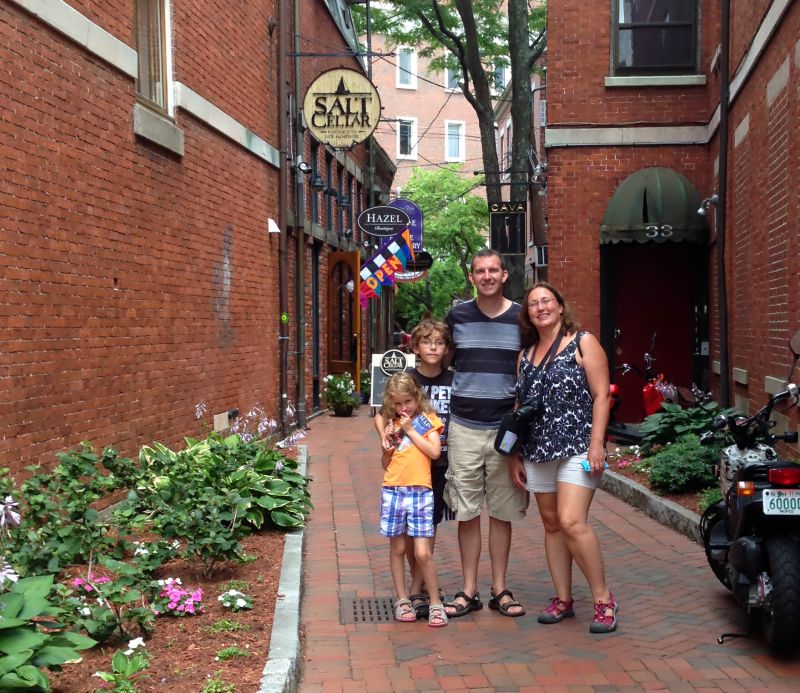
Charlottetown, Prince Edward Island, Canada
To my undying embarrassment as a Canadian, I haven’t visited Charlottetown personally. It’s at the absolute top of my list of destinations to visit in the Maritimes.
Charlottetown is the charming capital of Prince Edward Island, with a small-town vibe, friendly community, historic buildings, and scenic waterfront. And don’t forget festivals and the renowned local seafood! Charlottetown is an inviting place for remote workers, with reliable internet, quaint cafes, and a burgeoning arts and culture scene.
The city’s relaxed pace of life and natural beauty, from rolling hills to sandy beaches, offer a serene setting if you want to work away from the hustle and bustle and it’s also a fairly affordable area to live in.
Kelowna, British Columbia, Canada
I’ve lived in Kelowna as our family’s home base for almost 10 years.
Kelowna is in the heart of British Columbia’s wine country, and based around the gorgeous, deep blue Okanagan Lake. Kelowna’s a picturesque setting for remote workers, with stunning lake views, mountain backdrops, and vineyards.
You’ll enjoy Kelowna if you appreciate the outdoors, with kayaking, hiking, paddle boarding, boating and skiing easily accessible (at Big White or Silver Star).
There’s also a robust and growing tech scene here, supported by fast internet, innovative coworking spaces (I like Okanagan coLab, but I generally work from home), and a vibrant community of entrepreneurs and digital nomads. The city’s mild climate, combined with a rich cultural life and farm-to-table dining, provides a quality of life that’s hard to beat. But I may be a little biased, since I live here and love it.
Kelowna’s not for you if you’re all about exciting nightlife, and designer brands though. There are nightclubs here, but they’re definitely not at the scale of a larger city, and lots of restaurants generally close by 10 (or well before). That said, in the summer there are more festivals here than anywhere we’ve ever lived, a thriving micro brewery scene and literally hundreds of vineyards within an hour of the city.

And there you have it, my sneak peek into the world’s lesser known destinations for digital nomads. Whether you’re craving sun-drenched beaches or bustling city streets, these spots have the perfect mix of work, culture, and adventure.
Who knows? Your next favorite coffee shop office could be waiting in one of these incredible destinations.
The post 15 Offbeat Digital Nomad Destinations You Need to Visit Now first appeared on The Barefoot Nomad.
0 Comments